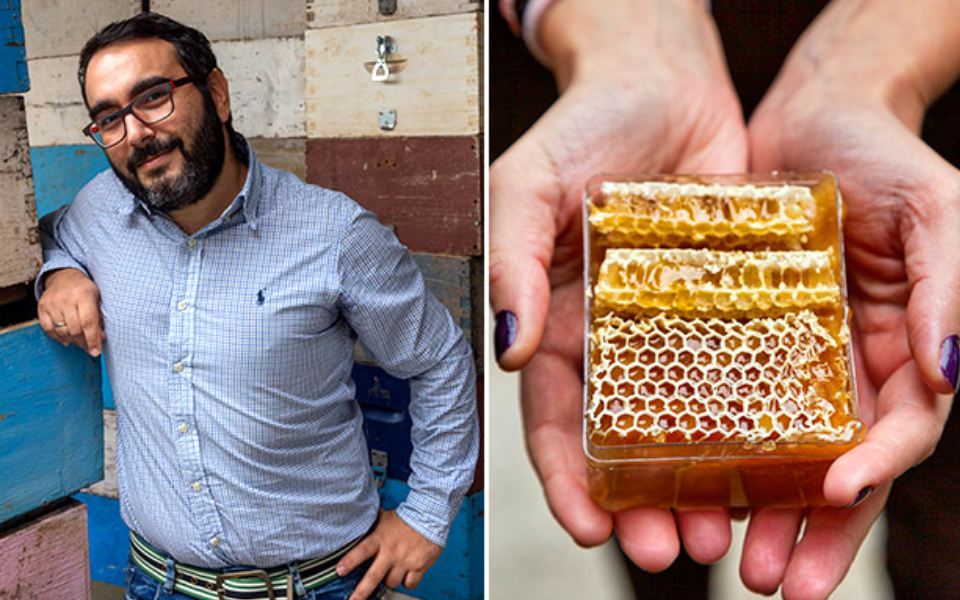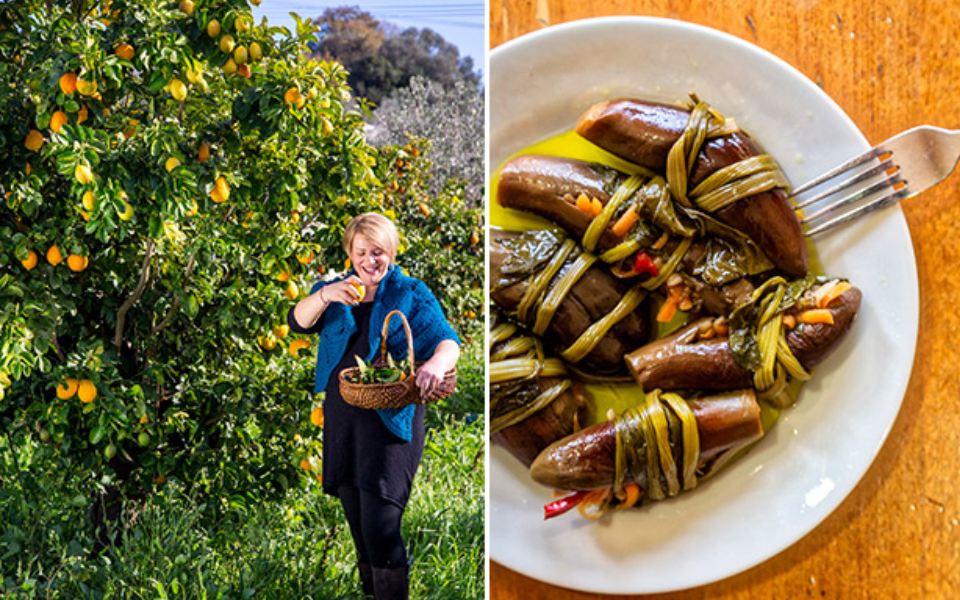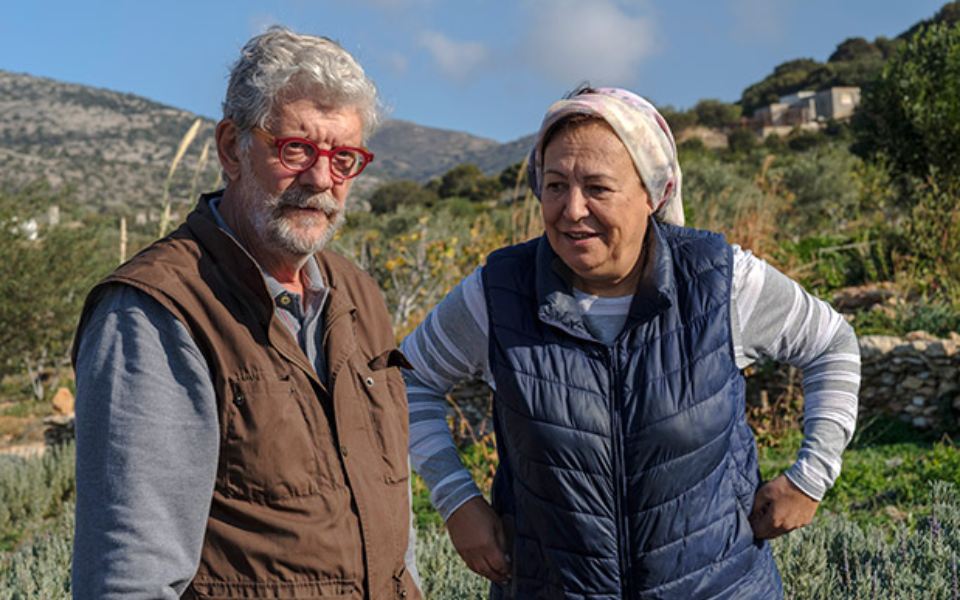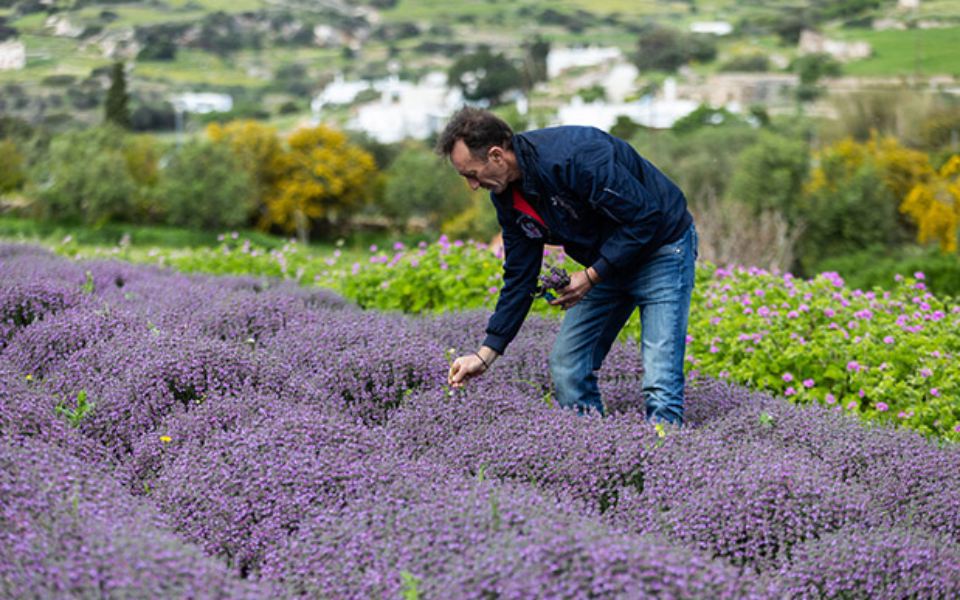ARCADIA
Vassilis Roumeliotis, beekeeper
“Between the sun shining on me and the fresh air I breathe, I feel like nothing can touch me.”
“The flowers are in bloom and the bees are working beautifully and efficiently, as if nothing had happened in the world,” Vassilis Roumeliotis tells us on the phone, painting a more optimistic picture of current events than is usual these days.
Roumeliotis, an Arcadian beekeeper, has approximately 500 beehives and a beekeeping business based in Tripoli in the Peloponnese. At present, his bees are in the mountains outside of Pylos. Once they’ve finished there, he’ll take them to forage among the heather, pines, mulberries and fir trees on Mount Mainalo and in the forest of Skiritida, and then to regions on the border between Arcadia and Messinia.

© Perikles Merakos
Roumeliotis harvests a number of organic products beyond honey, such as royal jelly, bee pollen and propolis – the last of which the bees use for various reasons, “not just to block the hive entrances and protect their home, but also to disinfect themselves. We take this propolis and use it in making various organic products.”
Propolis contains antioxidants and phenolic compounds: with the coronavirus crisis, Roumeliotis estimates that demand for it has increased by approximately 300% compared to the same time last year. In other words, the work hasn’t stopped, and the orders – each delivered by mail to avoid physical contact with clients in his shop – have been coming in at such a rate that, in theory, Roumeliotis could hire additional employees to handle the workload.
The only problem with doing so is that both he and the people he might employ are afraid: “Many of my friends who’ve been forced to close up shop want to work. They want to ask me, ‘Would you hire me to work on the beehives so I can make some money?’ – but I know they’d hesitate once I brought up the fact that we’d all have to get in the same car to get there, just as I’d hesitate to do it, too.”
However, in spite of the workload and the particular challenges of the job, his everyday life remains quite pleasant: “In all the panic that has emerged, I feel better going to the beehives. Between the sun shining on me and the fresh air I breathe, I feel like nothing can touch me. All I see around me are mountains, trees and bees. Nothing else.”

© Perikles Merakos
MESSINIA
Maria Douvogianni, small business owner
“I’m harvesting nature’s bounty with my son for the first time”
Maria Douvogianni has set up a small cottage industry using local fruits and vegetables to make spoon sweets, jams, syrups and chutneys; she distributes her products to restaurants and food retailers in Greece and abroad. She says that she started making sweet preserves as a form of therapy when she lost her mother.
Her family owns various parcels of land from which she harvests most of her raw materials. “Luckily enough, the weather has been great, and the citrus fruits have come out slightly earlier in Messinia this year. I’ve had time to prepare jars of orange, bergamot and mandarin preserves. I closed down the workshop before the lockdown was announced. Health comes first… When the tourist season eventually opens, I’ll be able to supply my Greek customers: hotels, grocery stores and shops in tourist areas.”
“I’m not working at the moment, although I still go into the fields for walks and to see how the fruit trees are doing. My father does the same. He insists that you won’t encounter the virus in the fields. These days, he kills time by picking fresh peas and bringing them to market with my brother’s help. For me, it’s important not to lose the fruit. The strawberries are coming out now; you can smell them everywhere. If I don’t reopen soon, I might just make jam out of them instead of spoon sweets, which require that the fruit remain intact.”
What about her newest helper? “My son is 13 years old. He wants to go out… after his lessons. He goes to a private school, which quickly adapted to the new circumstances. He is kept busy every day with the online teaching they provide. They mainly go over material they’ve already covered; it’s mostly to keep the classroom atmosphere alive. When class is dismissed, he has nothing to do. You can’t just play board games and video games all day. So the other day, I took him on a walk around the fields. We’d never done this before, just the two of us. We collected wild asparagus and oranges. Then we went home and pressed out some fresh juice. He asked me if we could make jam with the remaining fruit. It was a novel experience for us, and I enjoyed it a lot. Every cloud has a silver lining.”

PAROS
Stavros Tsavalos, owner of Kamarantho Active Organic Farm
“Then I go back home, but at least I can still look out the window and enjoy the sight of nature.”
Those who have been to Paros in the spring know that it looks more like an island in the Sporades than one in the Cyclades, especially when it has rained enough over the winter to turn the island completely green. And this year, it has. “We were quite lucky. We’ve had a fair amount of rain from November and December until now. It will be even better in a month.”
Stavros Tsavalos and his wife Katerina are the owners of Kamarantho Active Organic Farm in Kamari; it has olive trees, pomegranate trees, acacias and fig trees, and they grow rosemary, oregano, marjoram and dittany, too. They also have a greenhouse, “for experimentation” – in it, they grow bananas, papayas, physalis berries and wild chicory.
In addition to producing organic products, the owners implement permaculture methods: “Nature follows various techniques to allow the ecosystem to develop and expand in a natural way, and we simulate these techniques.”
At Kamarantho, they practice polyculture rather than monoculture: different trees and plants are selected to create an environment where each supports the other. Additionally, the organic matter derived from pruning and mowing is recycled. “We make our own compost and use it as a natural fertilizer. We also use plants that don’t produce anything but can absorb nitrogen gas directly from the air and pass it on to the ground through their roots, so we don’t have to add nitrogen to the soil.” Unfortunately, like all tourism businesses in the country, the Kamarantho farm has become a victim of the coronavirus, too, and will not be receiving any guests until the restrictive measures are lifted.
“I realize that, in the best-case scenario, everything will remain closed until mid to late July. The reservations have been cancelled, the rooms and hotels are empty, and the restaurants are closed.” However, Kamarantho still finds ways to work its magic. “My days consist of going to the field at eight in the morning to work: I apply microbial fertilizer, look after the compost and attend to various problems such as leaks in the irrigation system. This keeps me busy until noon, and keeps my mind off the coronavirus. Then I go back home, but at least I can still look out the window and enjoy the sight of nature.”
This article was originally published on kathimerini.gr












